Booker Prize Shortlist
Howard Jacobson (a personal favorite) is among the six writers to make the shortlist for this year’s Man Booker prize. The others are Emma Donoghue, Damon Galgut, Andrea Levy, Peter Carey and Tom McCarthy.
A Brief History of Making Sense of the Iraq War
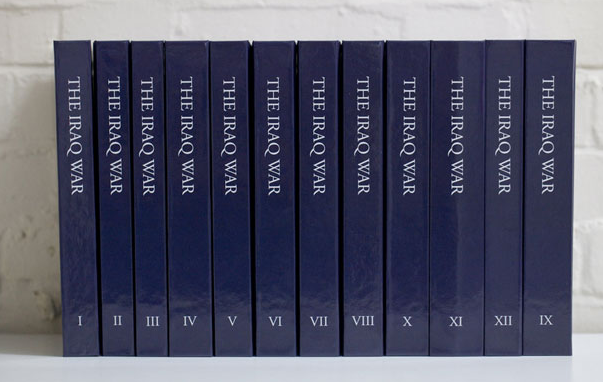
“This particular book-or rather, set of books-is every edit made to a single Wikipedia article, The Iraq War, during the five years between the article’s inception in December 2004 and November 2009, a total of 12,000 changes and almost 7,000 pages. It amounts to twelve volumes: the size of a single old-style encyclopaedia. It contains arguments over numbers, differences of opinion on relevance and political standpoints, and frequent moments when someone erases the whole thing and just writes ‘Saddam Hussein was a dickhead.’” (via)
Instructions for Visiting the American Wilderness: A PowerPoint Presentation
by Thomas Blair


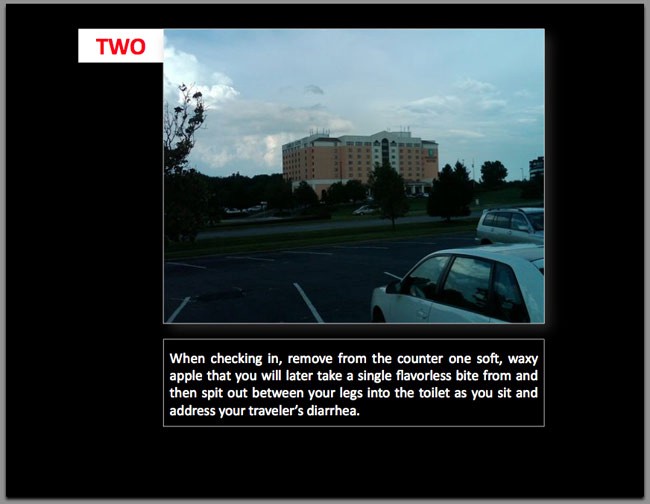
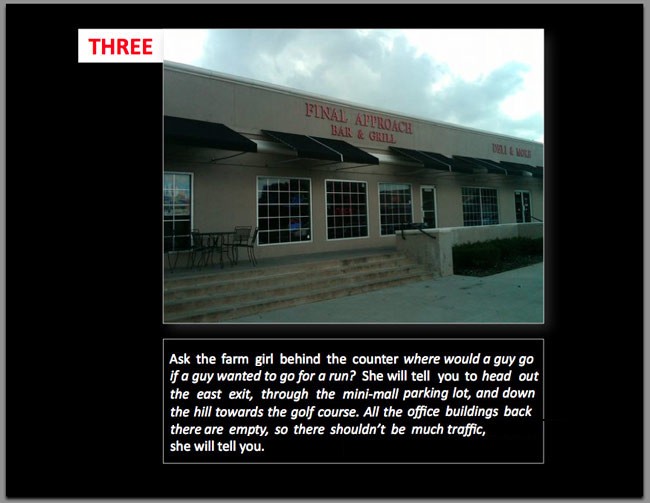
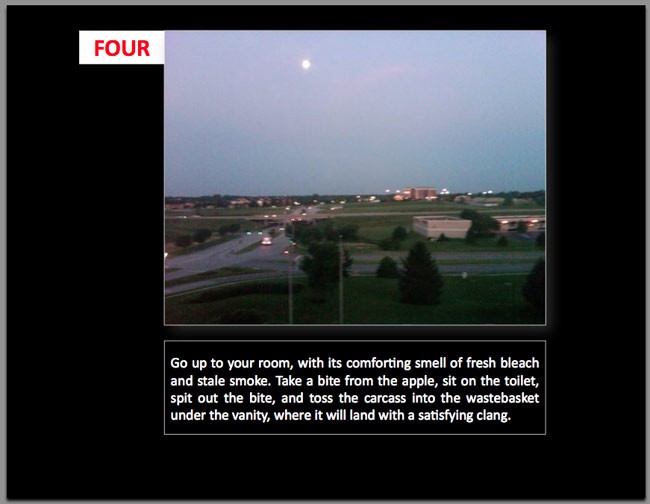

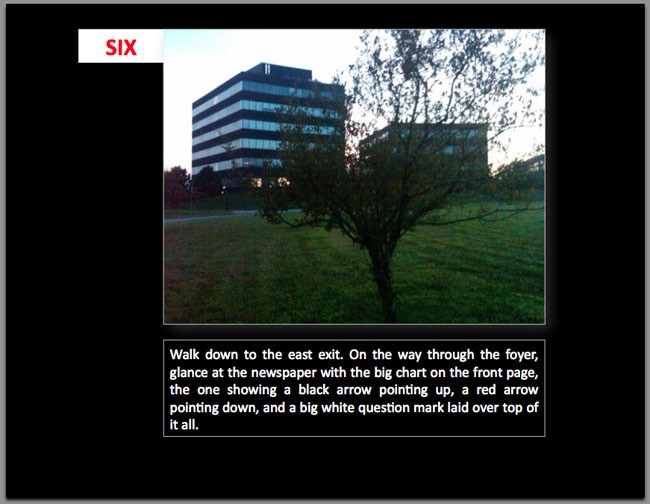
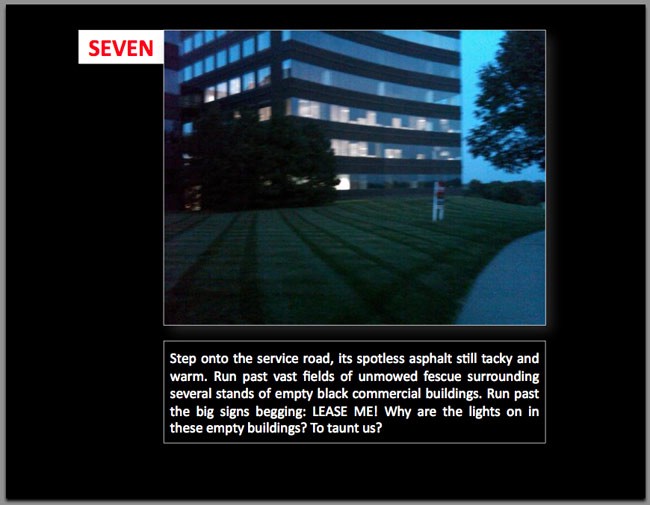
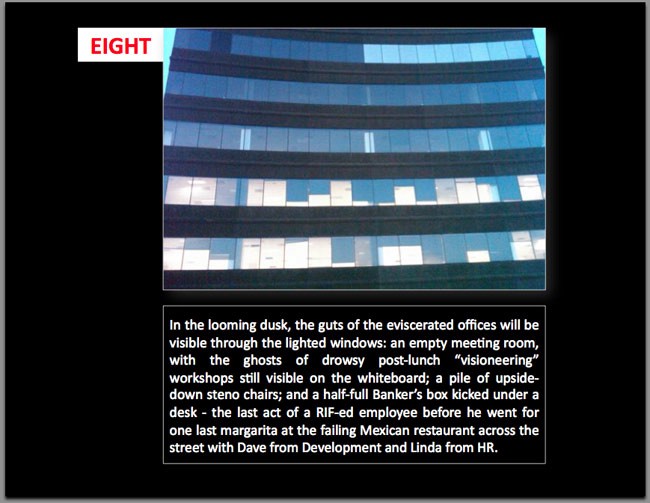
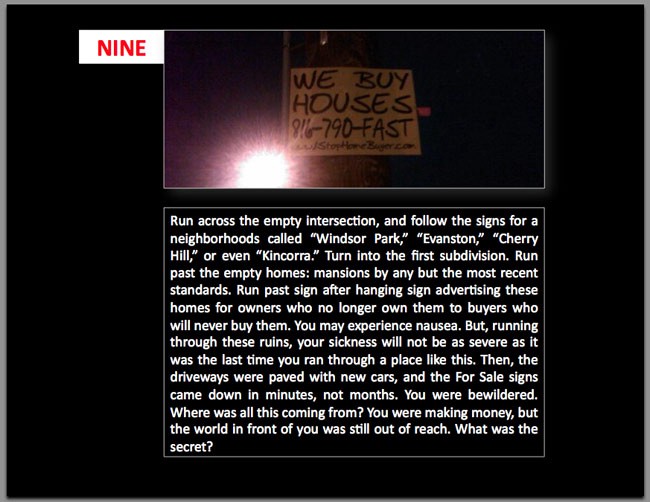
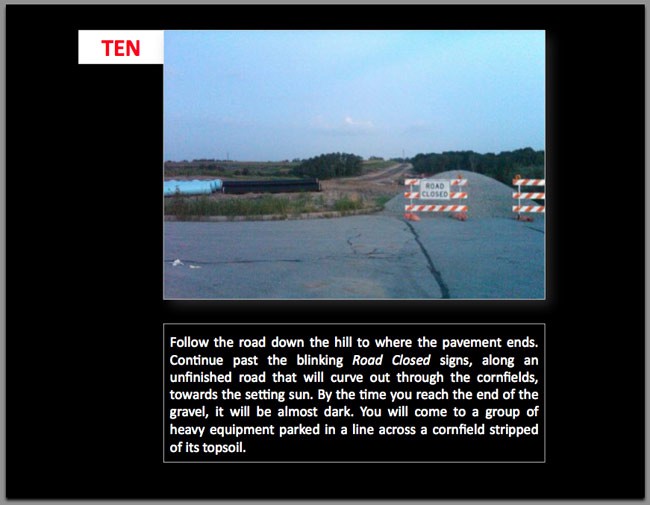

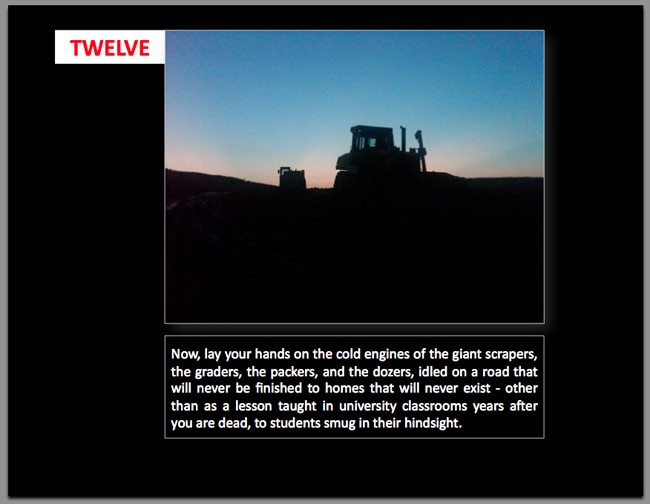
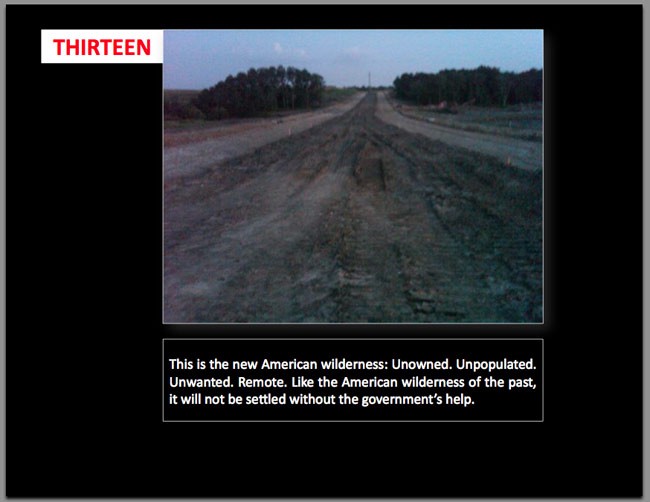
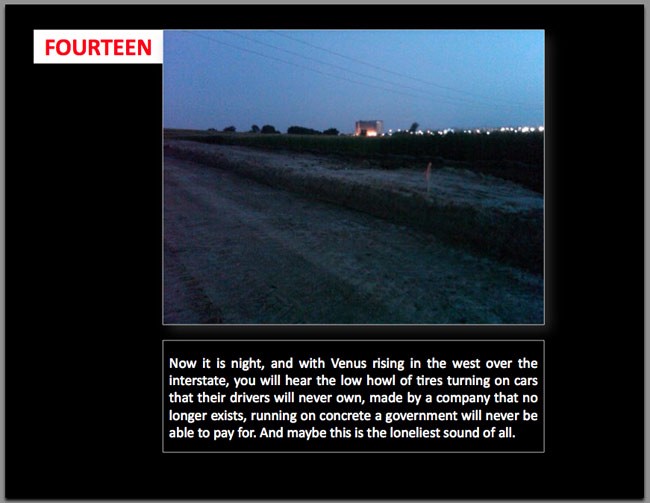
After completing an introductory English as a First Language class this spring, “Thomas Blair” decided to become a famous writer. Alas, he discovered that all those jobs are taken. As a stop-gap, he has decided to direct a non-polemical feature-length documentary film about doping in the sport of professional bridge. He’ss that close to booking the Buffet interview. You can fall in love with Mr. Blair here.
Two McNally Jackson Booksellers Argue About Jonathan Franzen's 'Freedom'
by Dustin Kurtz and Sam MacLaughlin
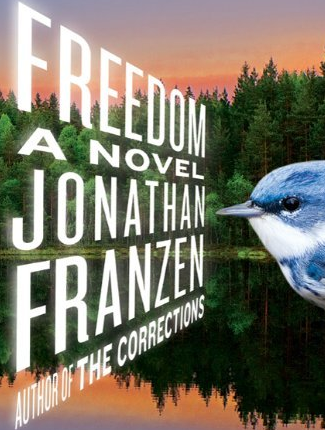
Sam MacLaughlin: Hi Dustin!
Dustin Kurtz: Hello Samuel. So, introductions of our various stances, maybe?
Sam: Maybe! We are both sad young white literary men, yes?
Dustin: Emphasis on the sad and white, yes. Our manliness being in dispute at times.
Sam: At times. I do carry a tote bag. And: you’re not a female novelist, are you?
Dustin: No, so I think we can agree that my dislike of this book won’t come from anything as disagreeable as politics. Unless there is a political party fighting for better prose?
Sam: Which book!
Dustin: THE book, young sir, the book of our generation!
Sam: The book that takes the datum of our shared millennial life, and limns, like, mostly everything that needs a limning?
Dustin: The tome, generations hence, that people will use to judge your immortal white literary soul.
Sam: Freedom!
Dustin: Freedom!
Dustin: I wish we could have done that simultaneously.
Sam: It was pretty simultaneous.
Dustin: So you would choose this book over the life of your firstborn, yes? Whereas I think it has flaws (so nuanced)! Sometimes little but.
Sam: I think it has flaws, too, but I would say that this is a great book. I am not an enemy of Freedom.
Dustin: Can we actually get seriouschat here and make a distinction between a great book and a great novel?
Sam: Let’s. I bet you have ideas.
Dustin: I do! Greatness aside (very much aside) this book is a successful novel in many ways.
Sam: Agreed.
Dustin: When we talk about The Novel (all the time, I’m sure) we’re talking about a specific layering of detail, adherence to some rules, all of which this does very well.
Sam: But?
Dustin: But if we want to talk about the worth of a book more generally, we have to look at the quality of the writing, and maybe it’s value to readers. Did I say seriouschat? Apparently I meant didacticchat.
Sam: They are probably the same thing. Does didactic-chat need a hyphen? That one is harder to read.
Dustin: What I’m saying is that if all it takes to be a good (honestly, not great, and definitely not Great) novel is the creation of this dense clay flesh around the frames of these characters, then Franzen is good.
Sam: And yet, as a member of the backlash (how does it feel?) you are denying greatness and Greatness. On what grounds? I’m still trying to figure out how it’s possible to hate Freedom. Also Freedom by Jonathan Franzen.
Dustin: Well, so let’s not get too much into whether he accomplishes his goals of a greater worth outside of that book, because I’m not Emerson and anyhow we both believe pretty soundly in the value of literature for its own sake. At least for well-fed bastards like you and I.
Sam: You want to talk about the book itself then? That’s what you want to talk about?
Dustin: You are the worst Socratic interlocutor I’ve ever had, Zingerman McZing.
Sam: Zingerman MacZing, please.
Dustin: What I’m trying to do is throw out the idea that you and the rest of the damn world are not necessarily wrong, that this might be a good novel. But I’m maintaining that it’s a pretty bad book.
Sam: Oh. Snap.
Dustin: Franzen is not a detailed writer, but an incidental one.
Sam: Right: I could make the same joke I always make about Anna Karenina: 700 pages of gossip.
Dustin: And I think that is some of what people are talking about when they call him old-fashioned. Well, that and the codpiece.
Sam: Always the codpiece. What an odd choice.
Dustin: With Franzen it comes out in a flat omniscient third that just sort of smears everyone and everything with his clunky segue phrasing.
Sam: I was re-reading some last night, and the first line of every chapter (saving the Patty chapters, but probably even those) could be: “Did you hear?”
Dustin: But I don’t even dislike that about him.
Sam: You do dislike something. I still have no idea what it is.
Dustin: He’s very good at the floating narrator who also gives us hints of the attitudes, if not as much the voice, of many characters in quick succession.
Sam: Free indirect discourse! My English degree is worth something. He’s very, very good at that.
Dustin: Easy with that second very. He’s okay.
Sam: I’m still trying to figure what you don’t like!
Dustin: The writing. So, the book.
Sam: Like, sentence by sentence, you dislike this book?
Next: Does Dustin dislike the book sentence by sentence???
Dustin: Well, if “dislike” is all we’re talking about, I also dislike almost every character. What you mean is why do I think it is not a good book.
Sam: Right.
Dustin: I still think people can read it and enjoy it, and so it’s worthwhile in that regard. Also: population, coal, bitterns. I feel like I have to start quoting sentences?
Sam: Yes, let’s get specific. Which’ll allow me to let the snobbery of “people can read it and enjoy it” slide.
Dustin: You have the best come-ons. I don’t expect men in codpieces to be able to write the perfect sentence. I wouldn’t know it if I read it. But: “Here, all at once, Joyce’s face crumpled up terribly” might not be it. On the same page, Joyce “look[s] out a window woefully.”
Sam: Okay! But: I bet that’s in a Patty section, right?
Dustin: Please. The first Patty section is the best-written in the book. But yes.
Sam: I don’t think you can attack the prose of the book based on the Patty diaries.
And I’d argue Patty’s prose is intended to rankle that way
Dustin: 1.) They are half the book, so maybe I can use them to judge the book and 2.) Be honest, you just like that Conor Oberst gets a shout out. That’s fair about the Patty passages. They certainly rankle the fuck out of Walter.
Sam: But you are using them to judge to book as if they are presented straightfacedly, without ironic distance. As for 2.), yes, completely.
Dustin: Should I quote a Joey/Connie scene then? Right in the middle of the book? Those don’t suffer under Franzen’s coy “this is a diary” framing.
Sam: Wait, if you want, I could try to make a Larger Interpretive Point?
Dustin: Go for it.
Sam: Okay! So: I agree with you that none of the characters is perfectly “likable” (and I’m sure you agree that this is no way to judge a novel), but I think that Franzen is — argh, I don’t want to use the word “manifesting,” but here it comes — manifesting that dislike on a sentence-by-sentence level. The whole novel is vague: on the one hand, Volvo-owners are the worst; on the other hand, if I owned a Volvo, I would probably worry about weird noises my Volvo was making too. On the one hand, Walter’s project is going to save a lot of birds. On the other, they are displacing families and strip mining. On the one hand, Walter, on the other, Richard. Patty can be irritating, but also deeply sympathetic.
Dustin: You are arguing that this book is mimetic at the granular level.
Sam: Yes. And that its great success is getting you to keep reading despite the fact that we are snobs about sentences. Which I am! There were lots of groaners in there, but I somehow never groaned.
Dustin: I am still, in fact, groaning even now because of this book. I like your idea, and if I thought it were true I’d agree that Freedom (fucking Mel Gibson has ruined that word, yes?) is an incredible work a la Lispector’s Hour of the Star. And though that would be wonderful, if true, the book doesn’t sustain it.
Sam: How so?
Dustin: Support it, maybe. Doesn’t support it, like a codpiece with worn elastic.
Sam: Let’s not extend that metaphor much further plz.
Dustin: Your point then is not simply that irritation in general is built into the page at every level. You are saying that it is entirely contextual and specific irritation and bad phrasing.
Sam: That is not exactly what I’m saying, but close.
Dustin: If you were arguing that the book were subtly and purposefully irritating as a whole then okay, maybe he’s pulled a weird pastel-flavored Bataille thing in which every aspect of the book is bad. But if you are saying that the language of the book in its near-uniform clumsiness is meant to reflect the inner (and ALLCAPS OUTER) irritations of the characters, then I guess I’d say I’m surprised that Franzen wants all of his characters to sound like not-so-great novelists.
Sam: No! Not exactly. I think Franzen is using that ironic distance, and I think that that flat omniscient 3rd is mostly only ever as omniscient as “the neighborhood” (except Patty’s sections which are obviously Patty) and the narrative voice is deliberately not Franzen’s voice — we all know he can write sparkly sentences — but that of “the neighborhood.” And by presenting the story thusly (yep), Franzen opens up space for us to judge, but also to love. Though I might delete that. The italicized love.
Dustin: The distance is there, sure, and I think your point about “the neighborhood” is a good one, but again I don’t think the text bears it out all the time. Franzen draws too close. At the most generous we can say he’s tried what you’re proposing at times and failed at it more than succeeded. But yes, it’s interesting to read.
Sam: I think he’s succeeds more than not. Opinions!
Dustin: If you’re saying that the overall narration, even in the DIALOGUE! is his attempt, failed (yes) or otherwise, to reflect thought in this floating almost-close third, he’s certainly not succeeded there. Have you noticed his contractions?
Sam: Remind me about the contractions?
Dustin: He uses them so strangely. They feel far too few in the dialogue. We’ve also not talked about his silly thematic conceits.
Sam: Like FREEDOM?
Dustin: Like Patty and the team mindset? “Like birds,” Walter cawed.
Sam: “LIKE BIRDS!”
Dustin: I’ve read that he prides himself on the dialogue by the way. Like, he spends a lot of time reading those silly sentences with bad timing and silly anger aloud.
Sam: Till he’s hoarse!
Dustin: “Hmm,” Franzen thinks, softly caressing his codpiece, “this time when Walter shouts ‘bullshit’ over and over, should it be in italics or allcaps?”
Sam: BOTH! Now that we’re on Gchat all the time — we ALL OF US, not just you and I — those actually weren’t that obtrusive to me. Because I am so used to HYSTERICAL ALLCAPSISM. The Internet: It’s taking over our books.
Dustin: Is that it? I just wish I couldn’t read it and understand the distinctions in tone he’s trying to express? So you appreciate being trolled by Franzen, is your ultimate conclusion.
Sam: Yes. Whereas you do not. In all seriousness though, it seems like you and I think the novel is great/not-great for the same reason — i.e. the prose itself.
Dustin: Right, we both recognize the idiocy, but you believe it’s being put there, much like fluoridated water and nose-chips, as part of a larger plan. Nose-chips?
Sam: Nose-chips?
Dustin: Hey, you believe in them, not me. But yes, the prose is the major element in my disdain for this book.
Sam: Though it’s funny: in your good novel/good book distinction, in my mind it seems like Freedom should be (according to you) a bad novel but a good book? Like, the product of sentences following sentences is a novel, but the whole of the thing is the book. And I can easily imagine a perfectly crafted novel but a lousy book and a lousy novel but a great book.
Dustin: Apart from the perfectly crafted bit, that’s what I think this is. I think sentence by sentence it is poop by poop.
Sam: (We didn’t talk about the poop scene! (Let’s not. Franzen’s poopophilia is not a mystery I want to… dip my hands into?))
Dustin: But in the larger view is where I’m willing to give him credit.
Sam: Okay, but doesn’t it seem like the larger view ought to allow for Great Book-status?
Dustin: I think it is successful in that it IS readable, if not compellingly so like many people have said. And performs many of the duties expected of a novel with good old midwestern brio. See, but there is not just one consideration at this anything-above-a-sentence level.
Sam: What else?
Dustin: He succeeded at the form but failed as a writer and at imbuing the book with any value outside itself-again, a criteria I wouldn’t feel free to level if he weren’t so clearly striving to be read with just that in mind.
Sam: Not imbuing the book with any value outside itself is a very big claim, one that I’m not sure I want to try to dismantle, because then we’ll have to start talking about Literature and people will never read the Awl again. But: I disagree!
Dustin: Anyhow, I came into this very willing to call it a good novel, and you have convinced me that were he actively striving to irritate us at the sentence level throughout, which he isn’t because dude wants to sell books, then he would be a good writer and this perhaps a great book. Still no capital G, though.
Sam: Does that mean I win?
Dustin: You made an interesting point. You won my heart? But we both read the thing so of course we both lose.
Sam: Should we reward the people for sticking around with us for so long?
Dustin: Wait, are you saying goodbye? I have 500 more pages of bickering here ready to go (Pulitzer please).
Sam: I am more or less saying goodbye. We have books to monger! Ones even other than Freedom.
Dustin: Impossible sir, for without freedom what use is literature?
Sam: Like Coming & Crying, which we’ll have again on Saturday. Or Julia Holmes’ Meeks.
Dustin: Ah Meeks, very good. Very discomforting, but with less rape re-enactment.
Sam: Or the frigging Anthologist, for Chrissakes. That book: still a great book. 10% off to everyone on everything if they said that they read this thing on the Awl and oh my God it was so long and nobody won?
Dustin: Holy moly, I hope they don’t use the discount on this book.
Sam: We’ll let them use it on whatever they want. But what should we never forget about Freedom?
Dustin: I don’t know, the gross descriptions of cunnilingus?
Sam: Wrong! Never forget: Freedom isn’t free. It’s $28.
Dustin: Well, $28 and the cost of diminished expectations of your loved ones, hatred of the middle class, and at least two nights of your life. But that doesn’t show up on the receipt.
Sam: But also less if you ask for 10% off.
Dustin Kurtz is a bookseller, book reviewer, and maybe kind of a dick? He is from Michigan and lives in Brooklyn. You can also read him at his Tumblr. Sam MacLaughlin sells books at McNally Jackson; he bumblingly tumblrs for the store. They both run the Twitter. McNally Jackson Books is located at 52 Prince Street in New York City.
The Dorothy of South Street Seaport
by Ben Cohen

“Ladies! Dorothys!” yelled Mary Shriver at nine dark-haired young people. She is one of the producers of “WiZaRD,” an upcoming off-Broadway musical loosely built around the music of “The Wizard of Oz.” It was 9 a.m. on Thursday at the South Street Seaport, and the nine women were sitting on benches about 100 feet from a makeshift stage, which was built between a schooner and a mall. The bright-eyed actors carried bottles of water and cups of hot coffee, and some even wore pigtails.
On stage, George Bugatti, wearing shamrock green chinos, was excited about the remnants of Hurricane Earl coming up the East Coast-not quite a tornado, but good enough. “It’s perfect!” he said.
New York City was the last stop of an 11-city tour to find the young woman who would play Dorothy, the only role up for public audition in the jukebox musical based on the music of Harold Arlen, who composed the score for “The Wizard of Oz,” with Yip Harburg as lyricist. The show is set in the studio of a mythical radio station called WZRD. The characters are archetypal, Bugatti explained. The radio DJ is the wizard, he said, and “then there are three crooners.”
The day previous, fifteen Dorothy hopefuls showed up-more than 100 had registered, actually, but most canceled-and six had been cut. So yesterday, Bugatti was hoping to find one last Dorothy wannabe to pit against contestants from Jacksonville, Las Vegas and New Jersey. “We’re assuming New York will have a winner,” he said, pacing, even though he had barely sipped his Starbucks coffee. “I mean, it’s New York.”
The four would then go up for a national vote, via Facebook, to conclude last night at 7 p.m., and, finally, Bugatti would have his Dorothy. The show starts in December.
One at a time, each Dorothy slipped into costume: a white blouse, puffy at the bicep, underneath an egg-blue dress. She read a scene with another Dorothy wannabe, who assumed the part of the cowardly lion. (They took turns.) It was a cold reading; none of the women had seen the lines before. The lion fill-in left the stage, leaving Dorothy to perform her classic monologue, ending with the line: “There’s no place like home.” From there, she dived into “Over the Rainbow,” the tune that, depending on the performance, can tread from perfect to painful.
After acting and singing, the contestant would be evaluated by three judges: Bugatti; Hilary Gardner from “Come Fly Away,” Twyla Tharp’s Frank Sinatra Broadway musical; and Jerry Rosenberg, an associate producer. They sat at a table just a few feet away with Tom Gregory, the contest’s host and chief personality, wearing a lightweight floral-print jacket. “I would love to take a tour of his California closet,” Rosenberg whispered.
The judges offered comments, as if they were on “American Idol,” and then they jotted down their written rankings of the actors’ stage presence, acting, charisma and voice on a sliding number scale ranging from 1 (not for this) to 5 (outstanding). The judges were kind but dismissive when appropriate. They made occasional allusions to Judy Garland. Her name made the contestants blush. They commented on all facets of the presentation, from vivacity to vibrato, with a parade of adjectives: lovely, round, exquisite, gorgeous, marvelous, unique, captivating, warm, velvety, special, distracting, beautiful, incredible, opulent, unforced, natural, unstoppable and, once, referring to the cadence of a dialogue, “David Kelly-esque.”
Sometimes, they would peek over their shoulders and spot packs of tourists gawking, with the approval of their umbrella-toting guides. It’s not every day, after all, you visit New York City, let alone see costumed teenagers singing a showtune, backs to the water, facing the FDR Drive. It was something of a spectacle, not all that conducive to song. Planes buzzed overhead and bobbing boats hummed all around. After the first contestant performed-in her own sparkling red flats-Bugatti admitted that the aesthetics were a hindrance.
“I probably need to build helicopters into the scenes,” he said.
“Like ‘Miss Saigon,’” said Gregory.
“That’s right,” Bugatti said. “Dorothy in Saigon!”
Maybe it was the setting-probably not, though-but the first five contestants didn’t do much to distinguish themselves. They looked alike and sounded alike and acted alike. It was when Alexandra Fassler took the stage that it was obvious that New York City would, in fact, have a regional winner, someone who would earn the pair of sequined red heels resting atop a fluffy gold pillow on the judge’s table. (She won’t click them in the actual production, as the Dorothy from Las Vegas took the nationwide vote last night.)
Fassler was, to use a word the judges didn’t, dazzling. Her acting was deft, her monologue genuine. With “Over the Rainbow,” she embellished the sheet music, in a good way. When she was done, Gardner and Rosenberg heaped praise on her, and the panel turned to Bugatti, the Simon Cowell-equivalent in authority.
“With Richard Rodgers, if you didn’t sing what he wrote, well-” He pounded the table to feign Rodgers’ disgust, and the standing microphones amplified the ugly noise. “But Harold Arlen, he used to say, ‘When I write a song, it’s like a bird, waiting to fly away.’” It was a compliment.
Ben Cohen writes about sports for Deadspin and the Wall Street Journal.
Elephants Don't Like Getting Ants Up Their Nose
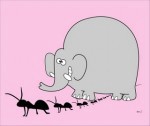
“Though elephants sport resilient, leathery exteriors, the skin on the inside of the animals’ trunks is extremely sensitive and tender. When an elephant grabs a branch from an ant-filled tree, the colony attacks. Tiny warriors swarm into the elephant’s trunk and bite the brute the where it hurts.”
–Elephants avoid certain trees in Africa because they can’t party as hard as Ozzy Osbourne.
Expanding The 'Human Centipede' Franchise
by Ned Frey
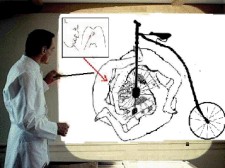
Apparently Dutch film writer/director Tom Six wasn’t content to make only one sick horror flick about multiple people sewn together to share a single digestive tract. A sequel to his 2010 film The Human Centipede is now in the works-this time featuring 12 people joined ass-to-mouth, instead of just three. So he plans to supersize the human centipede! What could be more impressively American than that-especially coming from a Dutch guy?
In a recent interview Six said that The Human Centipede II is likely to be released in early 2011, and that he’s considering making yet another sequel after that. He didn’t reveal any potential concepts for a third film-probably because he hasn’t come up with any yet-but I’ve dreamed up several of my own sequel ideas that I’d be happy to share with him once he’s ready to move forward. Here are the four most promising so far-including my proposed title, a brief plot synopsis, and a few pros and cons for each. (Tom, if you’re interested, call me!)
The Human Velocipede
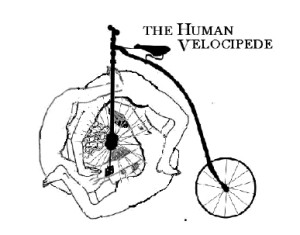
Synopsis: A mad surgeon stitches three victims together, anus-to-mouth, into a closed loop wrapped around a pedal-equipped axle. He then bolts that axle to antique cycle frame with a small wheel at the back, so that the three conjoined victims form the front wheel of late-Victorian-era “penny farthing” velocipede. The madman then dons old-fashioned attire, including a bowler hat, and rides his creation around in the back yard while tipping his hat to imaginary passers-by and saying things like “Good morning, madam! Good day to you sir! Have you seen my new velocipede? An ingenious invention, is it not?” As he does so, the surgically conjoined trio of victims moan in fear and pain as they are forced, via pedal propulsion, to roll along the ground.
Pros: The mad surgeon’s obsession with 19th Century artifacts would provide opportunities to lend a cool, “steampunked” flavor to the film’s art direction and marketing graphics.
Cons: Because the victims couldn’t eat with all their digestive orifices sewn into a closed loop, the surgeon would have to feed them intravenously — perhaps using a contraption resembling a bicycle pump. This feeding method wouldn’t be nearly revolting enough compared to original film.
The Human Centaur
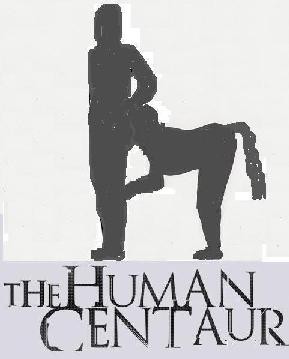
Synopsis: An evil surgeon sews two people together, ass-to-mouth, and forces them to stand in the pose of a single, horse-shaped creature. He also attaches a horse’s tail to the woman who forms the back half. As she whimpers in horror and fear, the mad surgeon whips the man who forms the front half, forcing him to eat oats and hay. This anguished man, who speaks only Japanese, shouts things like “Masaka! Watashi no wa, hoshikusa o taberu koto ga dekinai! Wa watashi no hoshikusa o taberu koto o kyÅsei shinai!”-which means “No! I cannot eat the hay! Please do not make me eat the hay!”
Pros: Limiting the number of victims to two would save money on actor salaries.
Cons: The title is semi-redundant, because centaurs are already half-human by definition. More accurate titles-such as The 100% Human Centaur-would lack zest.
The Human Millipede
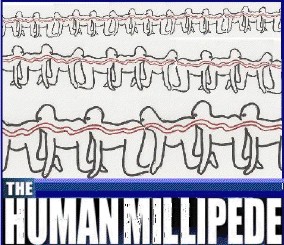
Synopsis: A bus carrying the cast and crew of a touring production of Les Miz breaks down in a remote location. All 51 occupants wander in search of help until they arrive at the home of an evil surgeon, who invites them inside. There, they are knocked unconscious with gas and stitched together to form a creature as long as it is horrifying-with 50 mouths sewn to 50 anuses! The mad surgeon then forces his conjoined victims to do a crawling conga dance in a long, snaking course around his house and yard, while he cackles maniacally and plays Harry Belafonte music.
Pros: 51 victims instead of three equals 17 times the horror!
Cons: Getting 51 actors to act believably terrified, simultaneously, would be a challenge. Inevitably, one or two would probably giggle or look bored, undermining the film’s verisimilitude.
The Centipede Human
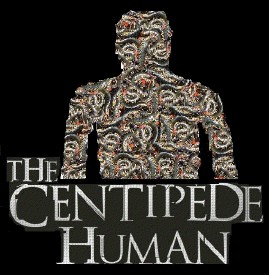
Synopsis: An evil scientist captures thousands of centipedes and sews them together into a huge, human-shaped mass. He then dresses this creation in clothes and trains it to walk around and scare people.
Pros: None come to mind. This is actually a terrible idea for a movie, now that I think about it.
Cons: See above.
Ned Frey is a corporate writer who also pens stuff for blogs sometimes, often under the name “MisterHippity.”
We're Vampires, Baby, Sucking Blood From The Earth
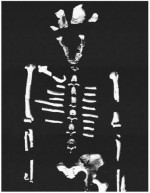
“The world needs TV shows that DEVELOP solutions to the problems that humans are causing, not stupify the people into destroying the world. Not encouraging them to breed more environmentally harmful humans. Saving the environment and the remaning species diversity of the planet is now your mindset. Nothing is more important than saving them. The Lions, Tigers, Giraffes, Elephants, Froggies, Turtles, Apes, Raccoons, Beetles, Ants, Sharks, Bears, and, of course, the Squirrels.”
You probably recognize that from “My Demands,” the manifesto of James J. Lee, who took three people hostage at Discovery headquarters in Washington D.C. on Wednesday before being shot and killed by a police sniper. The only way to save the planet, James insisted, was to stop the birthing of “parasitic human infants.”
He was insane, no doubt. And no one should ever take hostages or use guns or homemade explosives to make a point. But, strangely, as a report the very next day by Discovery’s own Jennifer Viegas proves (and I was never so happy to see that byline; I sort of have a crush on her), Lee was kind of right. Apparently, the earth is now undergoing its sixth “mass extinction event,” an event the scientists attribute entirely to human activity. As John Alroy, a researcher in the Department of Biological Sciences at Australia’s Macquarie University, told Viegas:
“There is no precedent at all for what we’re doing. All well-understood extinctions in the deep fossil record are tied to environmental changes that were not triggered by the behavior of individual species, such as the asteroid impact 65 million years ago that wiped out the terrestrial (non-avian) dinosaurs.”
It has yet to be determined whether this current mass extinction event will be as devastating the Permian-Triassic Extinction Event that wiped out 90 percent of the planet’s species 250 million years ago, earning it the cheery nickname of “The Great Dying.” I hope it’s not. But since human beings are actually thriving while all these other species perish, I’m sure if we really set our minds to it, we could make this an even GREATER dying!
That last part is weird and fascinating. Scientific American’s David Biello explains how our existence dooms so many of the earth’s other life forms-and actually makes our own existence less pleasant in many ways. Less pleasant in many ways, but better fed.
“Farming drives much of the ecological damage humans do: from habitat loss (and decreasing biodiversity) to messing around with the cycle of nitrogen through the environment. So while there are costs associated with the loss of other ecosystem services-an example on my mind this anniversary week is the loss of wetlands that helped doom New Orleans to the ravages of Hurricane Katrina-our continued success at farming trumps them.
Seen in this light, it’s like the aliens from Independence Day. As president Bill Pullman said, “They’re like locusts. They travel from planet to planet, their whole civilization. After they’ve consumed every natural resource they move on. And we’re next.” Except we’re not next.
The squirrels are next.
Victory! Our Child Porn-Loving Government Getting Smaller Every Day!

“The total number of unemployed people rose to 14.86 million in August from 14.59 million in July”-that’s because the government is shrinking! More of those “census” jobs went way, 114,000 of them, and also 10,000 more non-federal government jobs. Great! “The number of people out of work for 27 weeks” is now only 6.2 million. Also, we know where they could cut some more jobs! At the Defense Department, which allows its employees to purchase kiddie porn online without fear of prosecution! It’s understandable, since we all know that Barack Obama’s native culture encourages the sexual abuse of children. (The President is an Afghan Muslim, you see, and therefore not the valid commander-in-chief.) Have a great Labor Day weekend everyone, even if Labor Day was college-girl-marrying Senate-vetoer Grover Cleveland’s way of appeasing the unions. At least President Cleveland knew Hawaii should never be a state-which, if you think about it, since it didn’t used to be a state, that basically means Obama isn’t a real citizen anyway even if he was born there. Which he wasn’t. Think about that at your gay water polo pool party this weekend.
You May As Well Give In To 'Hobo With A Shotgun'
You May As Well Give In To ‘Hobo With A Shotgun’
BALK: Everything is going to disappear up its own asshole, isn’t it?
Choire: wtf
BALK: I feel bad for Rutger Hauer.
Choire: Oh he made his bed.
BALK: That is true. And he was warned!
BALK: “Nick Randall is played by Rutger Hauer, who will run his career into the ground by taking more such roles. Mr. Hauer, who is Dutch, has improved his American accent to the point where it sounds innocuously flat and seems to be emanating from somewhere other than his body, but in any case there is little for him to say. He is required mostly to shoot and sneer, and he does this in a wearily one-note way. ‘He’s the best there is at a job he hates,; say the posters for this film. If he doesn’t care, why should we?”
Choire: HAHAHAHA
BALK: http://www.nytimes.com/1987/01/16/movies/screen-a-tv-spinoff-wanted-dead-or-alive.html
BALK: 1987, dude.
Choire: Still, this will do very well. after “Machete” rules the box office this weekend.
Choire: Regarding which
Choire: CAN’T FUCKING WAIT
BALK: I pre-ordered!
